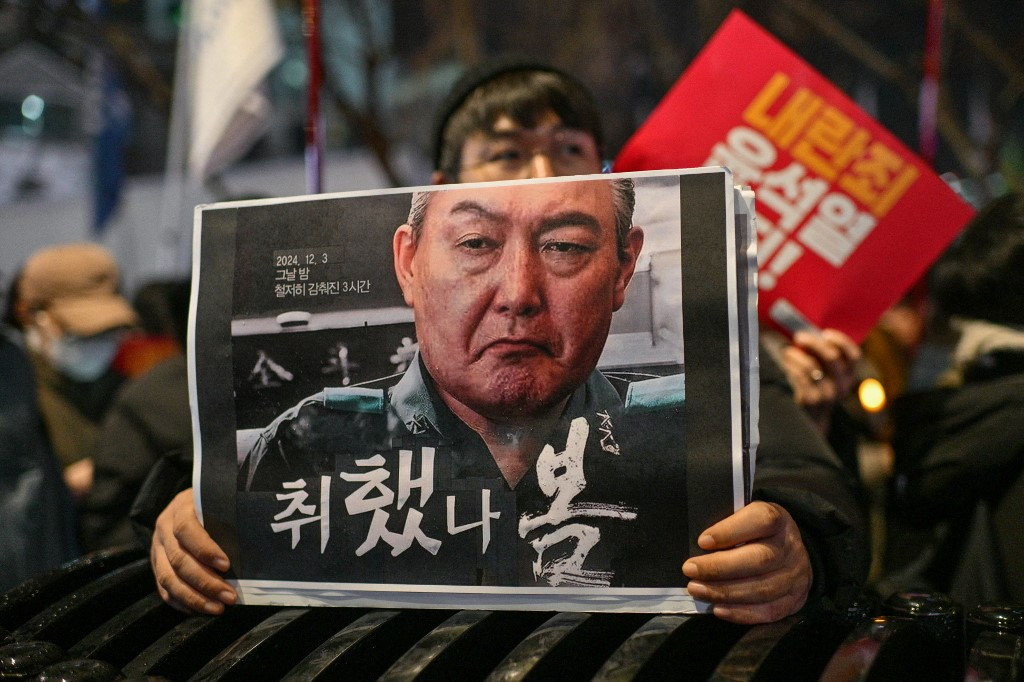Popular Reads
Top Results
Can't find what you're looking for?
View all search resultsPopular Reads
Top Results
Can't find what you're looking for?
View all search resultsCan South Koreans protect their democracy?
Many South Koreans have been reflecting on their decision to elect Yoon, questioning the motives of the People Power Party.
Change text size
Gift Premium Articles
to Anyone
A
s a second bid to impeach Yoon Suk-yeol gathers steam, South Koreans show that democracy’s light still burns brightly in Seoul.
Yoon Suk-yeol, whose clumsy attempt to impose martial law in South Korea has sparked outrage across the country, has always been out of step with the expectations of most voters.
His campaign for president in 2022 was marked by statements that caused consternation and may have hinted at what was to come. He advocated for an occasional 120-hour working week, the dismantling of food safety regulations and upset women with comments which seemed to blame them for South Korea's declining birthrate.
Tellingly, he was also forced to apologize for complimentary remarks about former dictator Chun Doo-hwan, who is a maligned figure in South Korea, responsible for human rights abuses, including the torture and killing of innocent civilians.
Yoon rose to prominence as the head of the Prosecutor's Office under then-president Moon Jae-in (2017-2022), gaining prominence for his role in the successful impeachment of Park Geun-hye, a former president accused of corruption.
Reforming the Prosecution Office, an institution notorious for using investigations to serve vested interests, was one of Moon Jae-in's key election promises.
At the time of his nomination, Yoon pledged to work with Moon. However, along with his close ally and long-time protege Han Dong-hoon, now a leading opposition figure, Yoon continued to manipulate the prosecution office's operations and policies.
While Moon's administration excelled in foreign affairs and maintaining peace with North Korea, his efforts at domestic reform faced resistance.
His Minister of Justice Cho Guk, a former law professor, led the push for prosecution reform. This angered Yoon, who launched a relentless investigation into Cho's family, focusing on allegations that Cho's spouse forged a certificate to benefit their daughter's university application.
These accusations alienated many young South Koreans struggling to find opportunities in an increasingly competitive and unequal society, similar to the dystopian themes in the hit TV series “Squid Game”.
As a result, public sentiment turned against Moon's government. Later on, Cho's daughter lost her medical license, and Cho was effectively dismissed from his university position. The damage to Moon's administration was significant.
Moon's failures to manage housing costs and complete prosecution reform further eroded public trust, paving the way for Yoon's rise. In the 2022 presidential election, the conservative People Power Party (PPP) lacked a strong candidate.
Yoon emerged as a viable option despite his controversial policies, including advocating for longer working hours and favoring nuclear energy over renewables.The PPP is not a typical conservative party in the Western sense but a faction focused on maintaining personal interests.
It has historically capitalized on the lingering effects of the Korean War and Japanese colonial rule, representing the socio-economic elite while neglecting grassroots concerns.
Yoon scraped into office in the closest election in South Korea's history. After being sworn in, he filled key government positions with school friends, prosecutors and officials from past unpopular conservative administrations.
His leadership has been marked by controversial decisions, such as permitting Japan to release treated wastewater from the Fukushima nuclear disaster, remaining indifferent to Japan's claims over Dokdo Island (known by the Japanese as Takeshima and elsewhere as Liancourt Rocks), straining relations with China and provoking North Korea unnecessarily.
Yoon's approval ratings have hovered around 20 percent in recent months. In recent weeks, a scandal surrounding media strategist Myung Tae-gyun and allegations of election irregularities, along with Yoon's wife, Kim Keon-hee, facing accusations of stock market fraud, have further eroded his standing.
The declaration of martial law on Dec. 3 is widely seen as Yoon's ham-fisted attempt to protect himself and his wife.
Leaked documents have also revealed that Yoon's allies, including Counter Intelligence Commander Yeo In-hyeong and Defense Minister Kim Yong-hyeon, had been planning a coup as early as March. Their strategy included provoking North Korea militarily to cause a conflict in order to to justify martial law.
On the night of Dec. 3, when soldiers stormed the National Assembly, thousands of civilians gathered at the court of the Assembly to protect its members, enabling them to revoke martial law and uphold democracy.
On Dec. 7, the PPP boycotted a vote for Yoon's impeachment, causing widespread outrage. Following this, Yoon's Prime Minister Han Duk-soo and PPP leader Han Dong-hoon declared co-leadership, a move widely seen as unconstitutional.
Another impeachment vote is scheduled for Dec. 14.
Many South Koreans have been reflecting on their decision to elect Yoon, questioning the motives of the PPP.
Yet, the people who put first their personal gains at the time of the presidential election are now "recalculating" their actions to prioritize the public interest.
South Korea's citizens have repeatedly demonstrated resilience and a commitment to democracy, surprising even their expatriate community.
With Yoon facing the prospect of another impeachment vote, I remain confident that they will once again rise to protect the democratic values they hold dear. They have reignited their candles, and, this time, cheering sticks for Korean democracy.
---
The writer is a professor in communications and media studies at Monash University, Australia, and commentator on Korean affairs. The article is published under Creative Commons license.










